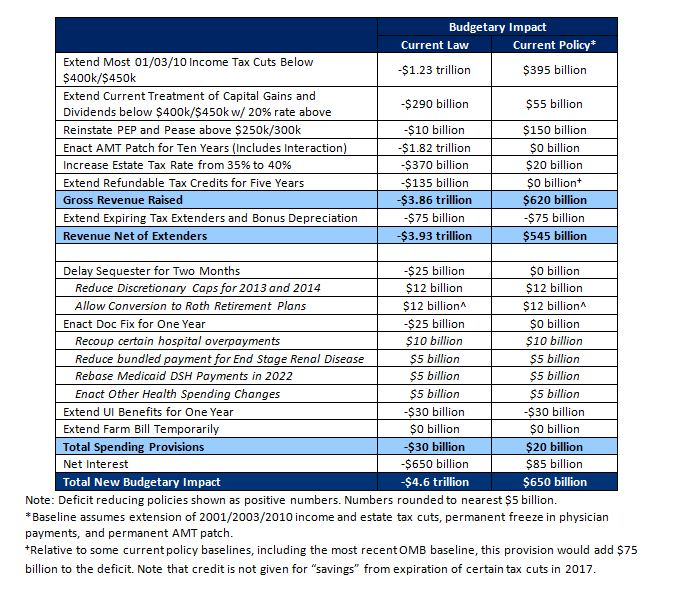The House Passes the Fiscal Cliff Deal
Last night, the House passed the fiscal cliff package already agreed upon by the Senate, by a 257-167 vote. Now the bill is headed to the White House, where it is expected to be signed by President Obama.
As we covered in our blog yesterday, "The Good, the Bad, and the Ugly in the Fiscal Cliff Package," the bill replaces the fiscal cliff with $650 billion in deficit reduction compared to current policy. The bill resolves many of the tax expirations that were part of the fiscal cliff. However, the sequester is only delayed for two months and the debt ceiling looms, requiring Washington to return to the issue of debt reduction in February and March.
As a reminder, below is our rough estimate of the provisions of the deal.

It certainly wasn't the "Grand Bargain" many had hoped for, but it is a small step toward fiscal responsibility. Fiscal Commission co-chairs and founders of the Fix the Debt Campaign Erskine Bowles and Al Simpson gave their thoughts on the bill yesterday in a statement:
The deal approved today is truly a missed opportunity to do something big to reduce our long term fiscal problems, but it is a small step forward in our efforts to reduce the federal deficit. It follows on the $1 trillion reduction in spending that was done in last year’s Budget Control Act. While both steps advance the efforts to put our fiscal house in order, neither one nor the combination of the two come close to solving our Nation's debt and deficit problems. Our leaders must now have the courage to reform our tax code and entitlement programs such that we stabilize our debt and put it on a downward path as a percent of the economy.
Washington missed this magic moment to do something big to reduce the deficit, reform our tax code, and fix our entitlement programs. We have all known for over a year that this fiscal cliff was coming. In fact Washington politicians set it up to force themselves to seriously deal with our Nation’s long term fiscal problems. Yet even after taking the Country to the brink of economic disaster, Washington still could not forge a common sense bipartisan consensus on a plan that stabilizes the debt.
It is now more critical than ever that policymakers return to negotiations that will build on the terms of this agreement and the spending cuts in the Budget Control Act. These future negotiations will need to make the far more difficult reforms that bring spending further under control, make our entitlement programs sustainable and solvent, and reform our tax code to both promote growth and produce revenue. We take some encouragement from the statements by the President and leaders in Congress that they recognize more work needs to be done. In order to reach an agreement, it will be absolutely necessary for both sides to move beyond their comfort zone and reach a principled agreement on a comprehensive plan which puts the debt on a clear downward path relative to the economy.
They may have missed this opportunity, but with so much still needed to be done in fiscal policy in 2013, lawmakers will have the chance to put debt on a sustainable path. It's an encouraging first step, but there is still much more to be done in reaching a truly adequate fiscal agreement.
The statement from Fix the Debt co-founders Erskine Bowles and Al Simpson can be found here.

